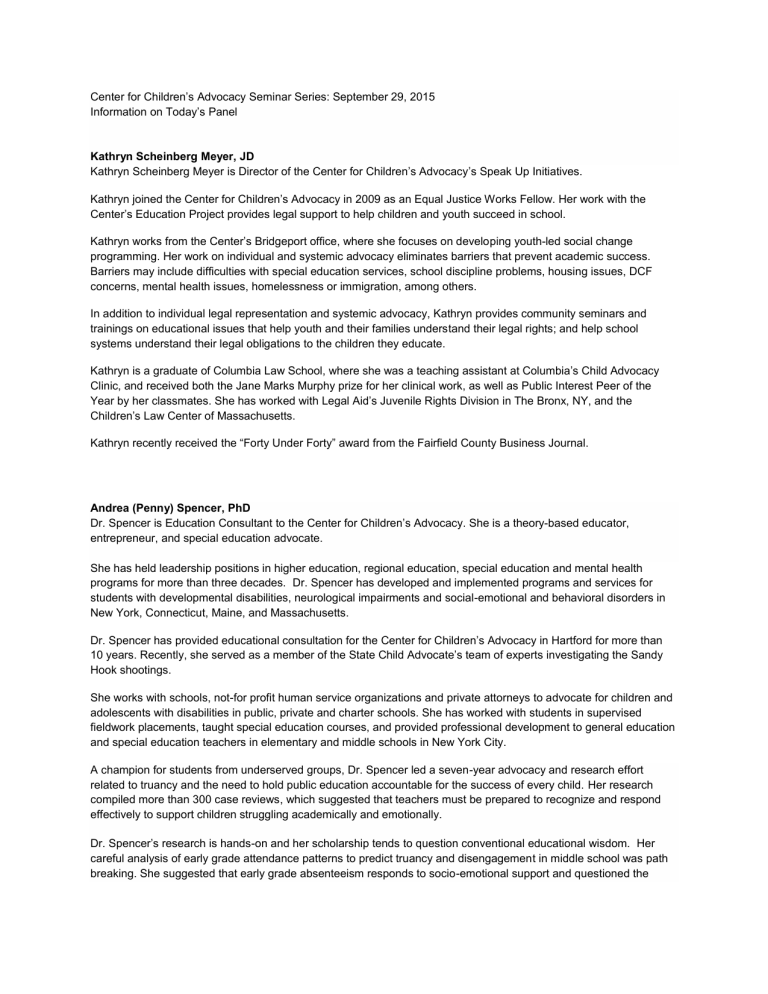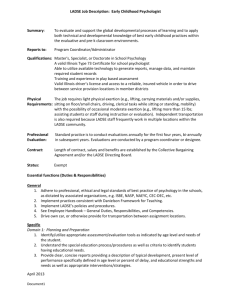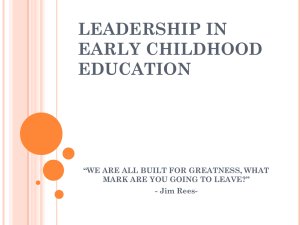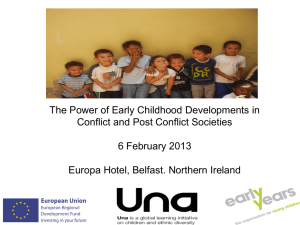Bios of Panel Members - Center for Children`s Advocacy

Center for
Children’s Advocacy Seminar Series: September 29, 2015
Information on
Today’s Panel
Kathryn Scheinberg Meyer, JD
Kathryn Scheinberg Meyer is Director of the Center for Children’s Advocacy’s Speak Up Initiatives.
Kathryn joined the Center for Ch ildren’s Advocacy in 2009 as an Equal Justice Works Fellow. Her work with the
Center’s Education Project provides legal support to help children and youth succeed in school.
Kathryn works from the Center’s Bridgeport office, where she focuses on developing youth-led social change programming. Her work on individual and systemic advocacy eliminates barriers that prevent academic success.
Barriers may include difficulties with special education services, school discipline problems, housing issues, DCF concerns, mental health issues, homelessness or immigration, among others.
In addition to individual legal representation and systemic advocacy, Kathryn provides community seminars and trainings on educational issues that help youth and their families understand their legal rights; and help school systems understand their legal obligations to the children they educate.
Kathryn is a graduate of Columbia Law School, where she was a teaching assistant at Columbia’s Child Advocacy
Clinic, and received both the Jane Marks Murphy prize for her clinical work, as well as Public Interest Peer of the
Year by her classmates. She has worked with Legal Aid’s Juvenile Rights Division in The Bronx, NY, and the
Children’s Law Center of Massachusetts.
Kathryn recently received the “Forty Under Forty” award from the Fairfield County Business Journal.
Andrea (Penny) Spencer, PhD
Dr. Spencer is Education Consultant to the Center for
Children’s Advocacy. She is a theory-based educator, entrepreneur, and special education advocate.
She has held leadership positions in higher education, regional education, special education and mental health programs for more than three decades. Dr. Spencer has developed and implemented programs and services for students with developmental disabilities, neurological impairments and social-emotional and behavioral disorders in
New York, Connecticut, Maine, and Massachusetts.
Dr. Spencer has provided educational consultation for the Center for Children’s Advocacy in Hartford for more than
1
0 years. Recently, she served as a member of the State Child Advocate’s team of experts investigating the Sandy
Hook shootings.
She works with schools, not-for profit human service organizations and private attorneys to advocate for children and adolescents with disabilities in public, private and charter schools. She has worked with students in supervised fieldwork placements, taught special education courses, and provided professional development to general education and special education teachers in elementary and middle schools in New York City.
A champion for students from underserved groups, Dr. Spencer led a seven-year advocacy and research effort related to truancy and the need to hold public education accountable for the success of every child. Her research compiled more than 300 case reviews, which suggested that teachers must be prepared to recognize and respond effectively to support children struggling academically and emotionally.
Dr. Spencer’s research is hands-on and her scholarship tends to question conventional educational wisdom. Her careful analysis of early grade attendance patterns to predict truancy and disengagement in middle school was path breaking. She suggested that early grade absenteeism responds to socio-emotional support and questioned the
imposition of no social promotion as a response to absenteeism and poor school performance among elementary school students.
Dr. Spencer earned a MED in Special Education from the University of Maine and a PhD in Special Education from the University of Connecticut. She is the author of the Center for Children’s Advocacy report entitled, “Blind Spot:
The Impact of Missed Early Warning Signs on Children’s Mental Health.”
Elizabeth Bicio. LCSW
Elizabeth Bicio is Director of the Early Childhood Consultation Partnership and Early Childhood Programs at
Advanced Behavioral Health. She is a graduate of the University of Connecticut where she earned a Bachelor of
Science in Special Education and a Masters in Social Work. Elizabeth is a graduate of the National Zero to Three
Leaders for the 21 st Century Fellowship. Her professional experience includes 10 years of clinical work along the mental health service continuum of both child and adult services. Elizabeth began her career working with high-risk youth at
New York City’s Covenant House. She has provided emergency psychiatric evaluations, adult mental health services and clinical services to children and families in behavioral health settings.
Her clinical work includes specializations in trauma, group work, and Mental Health Consultation and she has over 10 years of experience in program development, implementation, and management.
Elizabeth is the primary designer for the nationally recognized and evidence-based Early Childhood
Consultation Partnership (ECCP). Her expertise is in the development of a manualized service model with built in fidelity measures, ensuring results-based accountability.
Her presentations include “What Does an Early Childhood Mental Health Consultant do in the
Classroom? Establishing Practice Standards for Delivering ECMH Consultation,” at the international 14th
WAIMH World Congress. She is an active member of RAINE, which brings national leaders in the field of Early
Childhood Mental Health Consultation together to advance practice, policy and research. She is a member of various state groups that look to extend the quality of care related to social and emotional standards for young children, including the Governors Early Childhood Education Cabinet Health Promotions Work Group, the State
Department of Education Early Learning and Development Standard Development Institute –Social and Emotional
Development Co mmittee, Connecticut’s Disaster Preparedness DEMHS Child Safety and Crisis Response
Subcommittee on Child Care, and the Connecticut Infant Mental Health Endorsement Project.
Publications include
“Solid Ground: A Resource for Early Childhood Mental Health Consultation,” Elizabeth Bicio,
Sam Moy, and Heather Starkey (200
7); “Early Childhood Consultant Partnership in America,” Preschool Education
Journal (Beijing), Walter Gilliam, Tong Liu, Elizabeth Bicio& Ruibin Mei (2012/03); ECCP Application User Manual
V3.0” Elizabeth Bicio and Ron Ho,” (2009); and “Establishing Practice Standards for Delivering ECMH Consultation.”
Walter S. Gilliam, PhD
Walter Gilliam is Director of The Edward Zigler Center in Child Development and Social Policy and Associate
Professor of Child Psychiatry and Psychology at the Child Study Center, Yale School of Medicine. He is on the board of directors for the National Association of Child Care Resource and Referral Agencies; a fellow at Zero to Three and the National Institute for Early Education Research; and served as a senior advisor to the National Association for the
Education of Young Children (NAEYC). Dr. Gilliam is co-recipient of the 2008 Grawemeyer Award in Education for the coauthored book A Vision for Universal Preschool Education .
Dr. Gilliam’s research involves early childhood education and intervention policy analysis (specifically how policies translate into effective services), ways to improve the quality of prekindergarten and child care services, the impact of early childhood education programs on children’s school readiness, and effective methods for reducing classroom
behavior problems and reducing the incidence of preschool expulsion. His scholarly writing addresses early childhood care and education programs, school readiness, and developmental assessment of young children.
Dr. Gilliam has led national analyses of state-funded prekindergarten policies and mandates, how prekindergarten programs are implemented across the range of policy contexts, and the effectiveness of these programs at improving school readiness and educational achievement, as well as experimental and quasi-experimental studies on methods to improve early education quality.
Dr. Gilliam actively provides consultation to state and federal decision-makers. His work has been covered in major national and international news outlets ( New York Times , Wall Street Journal , Washington Post , USA Today , National
Public Radio , NBC Today Show , CBS The Early Show , ABC World News , CNN, FOX).
He holds a PhD and MSc from the University of Kentucky, and did his postdoctoral postdoctoral fellowship in Clinical
Psychology at Yale University School of Medicine.
Dr. Gilliam is conducting a series of statewide random-controlled trials, examining the effectiveness of mental health consultation infused into child care and early education systems. A series of studies examining preschool expulsion rates and practices are currently underway.
For a list of selected publications, please go to childstudycenter.yale.edu/faculty_people/walter_gilliam-2.profile
John Frassinelli
John Frassinelli is Chief of the Bureau of Health/Nutrition, Family Services and Adult Education at the Connecticut
State Department of Education. The Bureau includes more than 60 programs and initiatives: USDA Child Nutrition
Programs; school social, emotional, mental and physical health, school safety, climate improvement and bullying prevention; school nursing, counseling, psychology and social work support; parent, family and community engagement; support for homeless students; addressing chronic absenteeism, and assuring overall health as it impacts student emotional and physical wellness and achievement.
Mr. Frassinelli oversees the implementation of adult education programs statewide, the management of the GED high school equivalency testing program and alternative paths to high school diplomas.
Patricia Sullivan-Kowalski
Patricia Sullivan-Kowalski has been an educator in urban settings for 19 years. She has been an Assistant Principal and Supervisor of Special Education, and is currently Director of the Office of Pupil Personnel for Meriden Public
Schools. Her focus over the last 6 years has been on increasing appropriate programming for students of all abilities by building district capacity and working with families to meet student needs.









